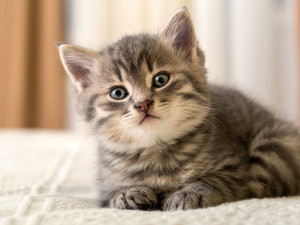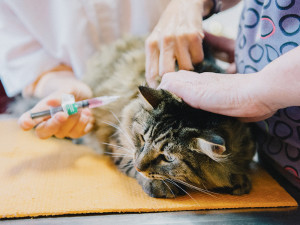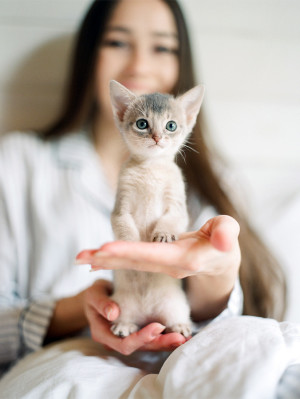Why Does Your Kitten Keep Sneezing? Find Out Why and What You Can Do
Because it’s cute when they sneeze… until it’s concerning.

Share Article
In This Article:
Understanding Kitten Sneezingopens in a new tab Common Causes of Sneezing in Kittensopens in a new tab Diagnosing the Cause of Sneezing in Kittensopens in a new tab Treatment Options for Sneezingopens in a new tab
Everything a kitten does is endearing — even sneezing. Of course, we’re talking about the occasional sneeze, not a string of sneezes that can knock them off their feet or leave them confused. A sneeze here and there is nothing to worry about. But frequent or prolonged sneezing, especially if your kitten is showing other signs, is something to look into.
Main takeaways
Sneezing is a normal reaction to irritants in the nose. Every kitten is going to sneeze once in a while.
Frequent or prolonged sneezing, especially when accompanied by other signs, could indicate a more serious issue like an infection or foreign body in the nose.
If your kitten is sneezing more frequently than normal, see your veterinarian.
Depending on the cause, a sneezing kitten may need medications and other supportive care.

littleKin™ is Kinship’s home just for puppy and kitten parents. Bop over to check out expert advice, new pet tools, and special deals—all curated for your newest family member.
opens in a new tabUnderstanding kitten sneezing
A sneeze is actually a pretty ingenious mechanism to clear the airways. When an irritant triggers the nose, a strong blast of air is released in order to blow that irritant out of there before it can do further damage. Sometimes it only takes one blast, other times it may take two, three, or a long string of sneezes until the body is satisfied.
Things that a kitten’s nose may interpret as an irritant include dust, grass seeds, pollen, or even inflammation from an infection. Of course, there are many more possible irritants, and how your kitten reacts to them will determine the amount of sneezing. For example, snorting up a bit of dust may cause one or two sneezes, while an upper respiratory infection caused by the feline calicivirusopens in a new tab is going to send your kitten down a sneezing path that can last several weeks or longer.
Common causes of sneezing in kittens
Nearly anything and everything can make a kitten or cat sneezeopens in a new tab, but let’s focus on sneezing that goes above and beyond the norm. The type of sneezing caused by the following situations and conditions is going to be frequent, long-lasting, and typically comes with other symptoms.
Environmental irritants
The lining of the nose is a very sensitive environment. It has to be, because it protects the lower airways by eradicating irritants before they get anywhere they can do damage. A bit of dust here and there may cause some occasional sneezing, but constant exposure to things such as smoke, cleaning chemicals, or even some air fresheners can make a kitten sneeze more than occasionally. Your best bet to stop this is to remove the irritant.
Respiratory infections
If microbes affecting the respiratory tract were given a choice, it seems like they would infect cats over other animals. Cats and kittens have many viral, bacterial, and even fungal threats out there that cause respiratory infections. The good thing is that they can be vaccinated for two of the most common ones, feline herpesvirus and calicivirus.
Along with sneezing, kittens with respiratory infections may also have watery or gooey eyes (and noses), coughing, fevers, loss of appetite, and sometimes difficulty breathing. Some respiratory infections will clear on their own. Others will need help from you and your vet.
Allergies
Allergies take a little time to develop. So they aren’t a likely cause of sneezing in young babies — but older kittens, watch out. As with humans, kittens can develop allergies to nearly anything in their environment. Dust, pollen, mold, and chemicals like smoke can all be contenders that leave a kitten sneezing with watery eyes, a runny nose, or skin issues.
Allergies are best treated by avoiding the allergen, which oftentimes requires more luck than anything else. If that’s not a possibility, see your vet for help.
Foreign bodies
A kitten’s nose may be tiny, but there are plenty of things that are even smaller and capable of getting stuck in there. When grass seeds, insects, or other small objects become lodged in the nose, this can result in plenty of sneezing as your kitten’s body does its best to clear the foreign object. There may also be some discharge or bleeding from the nose.
If sneezing can’t blow it out, an infection can set in, resulting in swelling, difficulty breathing, and a thick, colored nasal discharge. Dislodging foreign objects may require a vet’s help.
Vaccinations
Getting your kitten vaccinated is the best way to prevent many potentially serious diseases, but they can cause some temporary side effectsopens in a new tab, including sneezing. Intranasal vaccines, where the liquid is squirted up a kitten’s nose, may be more likely to lead to sneezing. But any vaccine can leave a kitten with a low-grade fever, lethargy, and sneezing as their body works to process the vaccine.
Most vaccination side effects will go away within a day or two. However, if your kitten isn’t feeling well after two to three days, visit your vet.
Diagnosing the cause of sneezing in kittens
The cause of repeated sneezing can be difficult to pin down in kittens. It’s going to take some time for you, and potentially your veterinarian, to figure it out.
Observe the signs
Make notes of when your kitten’s sneezing gets worse or better. Maybe they only have issues in one room of the house or during one part of the day. Look for other signs, such as nasal discharge, watery eyes, or difficulty breathing. Are they also pawing at their nose or rubbing their face, indicating that something is up there that shouldn’t be?
You can take this information and try some at-home methods, such as reducing your kitten’s exposure to certain things. But often enough, your kitten will need to see a vet.
When should you take your sneezing kitten to the vet?
If you’re able to nail down the cause of your kitten’s sneezing, great. If not, your vet will be able to dig a little deeper through an exam, which may include looking up the nose, as well as performing blood work and imaging.
Consider seeing a vet any time your kitten is sneezing more frequently than normal, or if that sneezing also comes with other signs, such as a snotty nose, watery eyes, coughing, a fever, or difficulty breathing.
What are the treatment options for sneezing?
Different causes of sneezing are going to require different treatments, so getting to the bottom of the issue is the first step.
Home remedies
You can help a kitten with allergies or affected by environmental irritants by reducing their exposure to the problem. Don’t smoke around your kitten or use cleaning products or air fresheners with strong scents. Consider an air filter to thin out allergens.
If your kitten has a respiratory infection, you may give them some relief by bringing them into the bathroom during your hot shower — the warm, moist air can help break up congestion. Don’t give your kitten any medications or supplements without talking to your vet first.
Veterinary treatments
Vet treatments will be a little more involved. Medications may be needed for respiratory infections or allergies. Foreign bodies may require sedation and removal. And severe vaccine side effects could necessitate some supportive care and time for your kitten to feel better.
Preventative measures
The best way to keep your kitten from getting sick is to get them vaccinated and avoid contact with other kitties, especially ones who may be ill. They can even catch germs from your clothes and shoes if you’re around other felines.
You’ll want to avoid using harsh chemicals in your home that could be irritants, and keep it as allergy-free as possible with regular vacuuming and if you have (or can buy) one, an air filter.
References
“Feline Calicivirus.” Cornell College of Veterinary Medicine, Baker Institute for Animal Health. https://www.vet.cornell.edu/departments-centers-and-institutes/baker-institute/research-baker-institute/feline-calicivirusopens in a new tab.
“FVRCP Cat Vaccine.” Maury County Veterinary Hospital. https://www.maurycountyvet.com/site/blog/2023/12/31/fvrcp-cat-vaccineopens in a new tab.
Weir, Malcolm DVM, MSc, MPH; Krista Williams, BSc, DVM; and Cheryl Yuill, DVM, MSc, CVH. “Herpesvirus Infection in Cats (Feline Viral Rhinotracheitis).” VCA Animal Hospitals. https://vcahospitals.com/know-your-pet/feline-herpesvirus-infection-or-feline-viral-rhinotracheitis.

Dr. Chyrle Bonk, DVM
Dr. Chyrle Bonk has been a mixed animal veterinarian since 2010. When she's not practicing or writing about veterinary medicine, you may find her exploring the outdoors with her family or tending to her cows, horses, chickens, or cats and dogs.
Related articles
![Young woman showing gray kitten.]() opens in a new tab
opens in a new tab5 Development Stages You Should Know When You Get a Kitten
What to expect from birth to 16 months.
![Woman holding small kitten in her hands.]() opens in a new tab
opens in a new tabKitten Weight Chart: Track Your Kitten’s Growth
See how they should be progressing.
![Newborn stray baby kitten, two weeks old adopted from the street in safe enviorment.]() opens in a new tab
opens in a new tabWhat Is Fading Kitten Syndrome?
Newborn kittens give you lots to worry about. Know the signs of this particular condition.
- opens in a new tab
What Can I Feed a Kitten?
Learn what nutrients are a must for your new little one.





